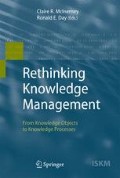Abstract
The challenge of augmenting transitions and transformations through technological design is addressed here by putting forward a model of Conversations for Reflection. This model helps deal with the practical problem of helping people develop their professional expertise. The model specifies procedural conditions that support the complex communicative activity of publicly testing private assumptions, surfacing dilemmas, and publicly discussing sensitive issues. This is illustrated by showing how the model informs two interventions that augment the development of expertise. The model follows from the theory of reflective practice, current understanding of accounting behavior in interaction, and the insights and recent developments in theory and research on the Language Action Perspective. The model, its rationale, and use illustrate an approach to understanding knowledge as a process.
Access this chapter
Tax calculation will be finalised at checkout
Purchases are for personal use only
Preview
Unable to display preview. Download preview PDF.
References
Aakhus, M. (2004). Felicity conditions and genre: Linking act and conversation in LAP style conversation analysis. In Aakhus, M. & Lind, M. (Eds.), Proceedings of the 9 th International Working Conference on the Language Action Perspective on Communication Modelling (pp. 131–142). New Brunswick, NJ.
Aakhus, M. (2003). Databases, argumentation, and common-sense. In C. A. Willard (Ed.), Critical problems in Argumentation: Selected papers from the 13th biennial conference on argumentation (pp. 459–465). National Communication Association: Washington, D.C.
Aakhus, M. (2001). Designing web-based interactional tools to support learning from experience. In M. Schoop & J. Taylor (Eds.), Proceedings of the Sixth International Workshop on the Language Action Perspective on Communication Modeling (pp. 51–67). Aachen: Mainz.
Aakhus, M. & Jackson, S. (2005). Technology, interaction, and design. In K. Fitch & R. Sanders (Eds.), Handbook of language and social interaction. Mahwah, NJ: Lawrence Erlbaum.
Conklin, J. & Begeman, M. (1988). IBIS: A hypertext tool for exploratory policy discussion. ACM Transactions on information systems, 6(4), 303–331.
Goldkuhl, G. (2006). Action and media in interorganizational interaction. Communications of the ACM, 49(5), 53–57.
Goldman, A. (1999). Knowledge in a social world. Oxford: Oxford University Press.
Lind, M. & Goldkuhl, G. (2003). The constituents of business interaction—generic layered patterns. Data & Knowledge Engineering 47(3), 299.
Makoul G, Aakhus M, Altman M, & Flores MQ. (2004, April). “Difficult Conversations” online forum: Helping students reflect on communication challenges during clerkships. Presented at the 27th Annual Meeting of the Society of General Internal Medicine, Chicago, IL.
Mokros, H. & Aakhus, M. (2002). From information seeking behavior to meaning engagement practice: Implications for communication theory and research. Human Communication Research, 28(2), 298–312.
de Moor, A. (2005). Patterns for the Pragmatic Web. In Proc. of the 13th International Conference on Conceptual Structures (ICCS 2005) (pp. 1–18), Kassel, Germany, July 2005. LNAI 3596, Springer Verlag, Berlin.
de Moor, A. & Aakhus, M. (2006). Argumentation support: From technology to tools. Communications of the ACM, 49(3), 93–98.
Pomerantz, A. (1978). Compliment responses: Notes on the co-operation of multiple constraints. In J. Schenkein (Ed.), Studies in the organization of conversational interaction. New York: Academic Press.
Schoop, M., de Moor, A. & Dietz, J. (2006). The pragmatic web: A manifesto. Communications of the ACM, 49(5), 75–76.
Scott, M. & Lyman, B. (1968). Accounts. American Sociological Review, 33, 46–62.
Schön, D. (1983). The reflective practitioner: How professionals think in action. New York: Basic Books.
Searle, J. (1969). Speech acts. Cambridge: Cambridge University Press.
Toulmin, S. (1972). Human understanding: The collective use and evolution of concepts. Princeton: Princeton University Press.
Tracy, K. (2002). Everyday talk: Building and reflecting identities. New York: Guilford Press.
Weigand, H. & Moor, A. de (2004). Argumentation semantics of communicative action. In M. Aakhus & M. Lind (Eds.), Proceedings of the 9th annual international working conference on the Language Action Perspective on communication modeling (pp. 159–178). New Brunswick, NJ.
Winograd, T. (1986). A language/action perspective on the design of cooperative work. Proceedings of the 1986 ACM conference on Computer-supported cooperative work (pp. 203–220). Austin, Tx.
Winograd, T. & Flores, F. (1986). Understanding computers and cognition: A new foundation for design. New York: Addison-Wesley.
Author information
Authors and Affiliations
Editor information
Editors and Affiliations
Rights and permissions
Copyright information
© 2007 Springer-Verlag
About this chapter
Cite this chapter
Aakhus, M. (2007). Conversations for reflection. In: McInerney, C.R., Day, R.E. (eds) Rethinking Knowledge Management. Information Science and Knowledge Management, vol 12. Springer, Berlin, Heidelberg. https://doi.org/10.1007/3-540-71011-6_1
Download citation
DOI: https://doi.org/10.1007/3-540-71011-6_1
Publisher Name: Springer, Berlin, Heidelberg
Print ISBN: 978-3-540-71010-3
Online ISBN: 978-3-540-71011-0
eBook Packages: Computer ScienceComputer Science (R0)

